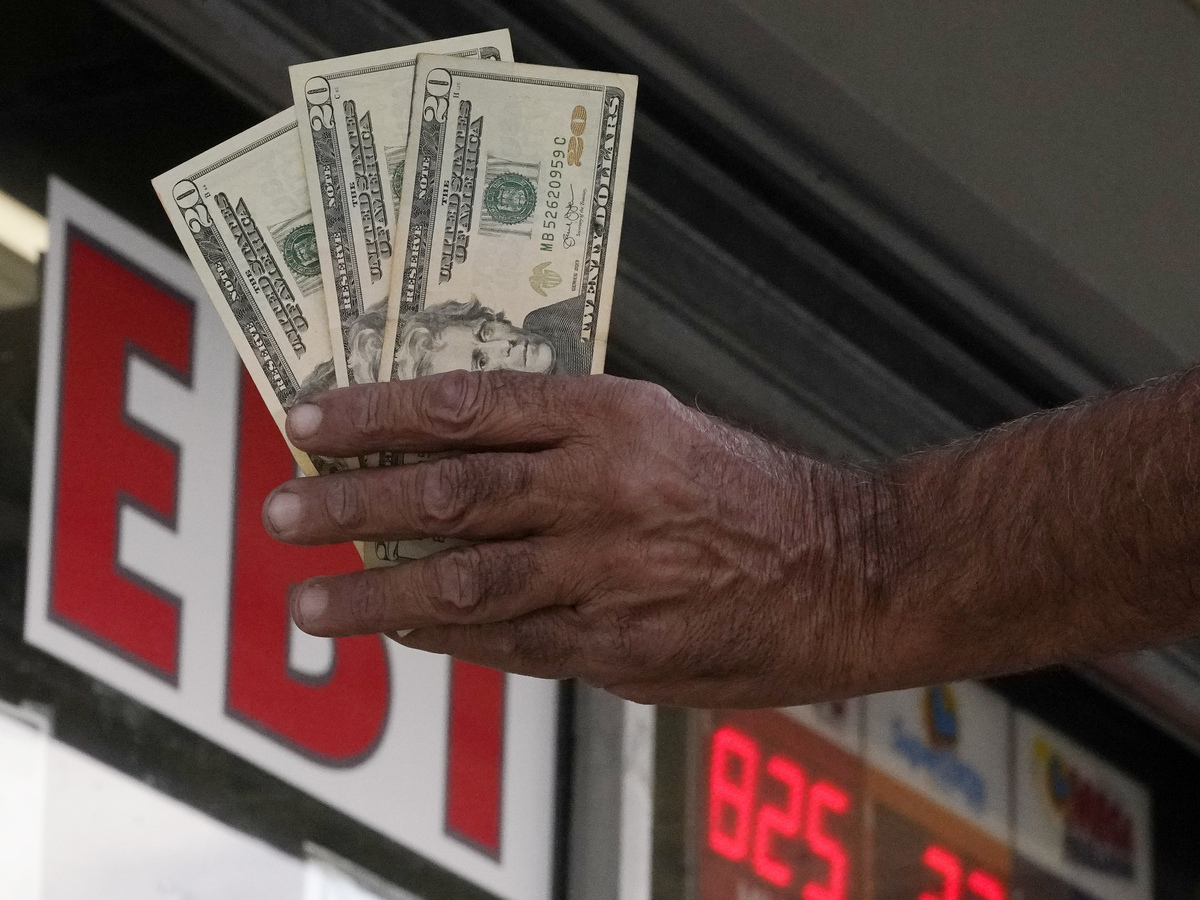
[ad_1]

A buyer is handed Powerball lottery tickets to bought at Lichine’s Liquor & Deli in Sacramento, Calif., Monday, Oct. 31, 2022. The jackpot for Monday evening’s drawing soared to $1 billion after nobody matched all six numbers in Saturday evening’s drawing. It’s the fifth-largest lottery jackpot in U.S. historical past.
Rich Pedroncelli/AP
disguise caption
toggle caption
Rich Pedroncelli/AP

A buyer is handed Powerball lottery tickets to bought at Lichine’s Liquor & Deli in Sacramento, Calif., Monday, Oct. 31, 2022. The jackpot for Monday evening’s drawing soared to $1 billion after nobody matched all six numbers in Saturday evening’s drawing. It’s the fifth-largest lottery jackpot in U.S. historical past.
Rich Pedroncelli/AP
Nearly three months after a Powerball ticket bought in Pennsylvania gained the $200 million money prize, the sport’s jackpot has increased to a now-estimated $1.2 billion.
The estimated complete is the second-largest prize in Powerball historical past and the fourth-largest jackpot in U.S. lottery historical past, according to Powerball’s web site. The U.S file was set in 2016 at $1.586 billion.
But till somebody is fortunate sufficient to match all six profitable numbers and win the jackpot, lottery gamers throughout the U.S. will proceed to shell out their {dollars} in hopes of beating the chances and profitable large. (As of Wednesday, the chances of profitable the jackpot had been 1 in 292.2 million, in accordance with Powerball.)
However, the drive to get wealthy off a profitable ticket has a darkish facet, critics say, arguing that state-run lotteries typically negatively influence low-income and minority teams.
“State lotteries are the most neglected example of systemic racism in the United States than any other issue or problem, I should say, in our country,” stated Les Bernal, the National Director for Stop Predatory Gambling, an advocacy nonprofit group, in an interview with NPR.
Bernal says that, via advertising and promoting, state-run lotteries don’t have any regulation to their “predatory practices” that have an effect on low-income communities — that are made up of primarily Black and brown folks.
“There are people who do develop unhealthy relationships with the lottery and they develop a gambling use disorder,” stated Timothy Fong, co-director of the Gambling Studies Program on the University of California, Los Angeles.
“There’s a tremendous amount of advertising and marketing that’s pro-lottery. Even on my Twitter feeds, I see this a lot…you know, very positive messaging that comes with it,” he added.
Studies present lotteries are clustered in low-income areas

Maher Diab holds up money earlier than shopping for lottery tickets at Bluebird Liquor, Friday, Oct. 28, 2022, in Hawthorne, Calif. Saturday’s jackpot projected winnings of an estimated $825 million is the fifth-highest in U.S. historical past.
Mark J. Terrill/AP
disguise caption
toggle caption
Mark J. Terrill/AP

Maher Diab holds up money earlier than shopping for lottery tickets at Bluebird Liquor, Friday, Oct. 28, 2022, in Hawthorne, Calif. Saturday’s jackpot projected winnings of an estimated $825 million is the fifth-highest in U.S. historical past.
Mark J. Terrill/AP
Over latest years, monumental jackpots for lottery video games like Powerball and Mega Millions have develop into the norm, as lottery officers adjusted recreation guidelines and ticket costs this yr for its gamers, in accordance with The Associated Press.
The most up-to-date change passed off in August when Powerball officers added a further drawing day in an effort to construct bigger prizes and increase gross sales.
But with the sport implementing new adjustments and extra drawings weekly, communities of colour and low-income communities are persevering with to develop into the topic of predatory playing.
Research shows that, in 2021 alone, Americans spent practically $105 billion on lottery tickets — with the typical grownup within the U.S. spending roughly $320 a yr on tickets.
In a nationwide investigation of state lotteries by the Howard Center for Investigation Journalism at the University of Maryland, researchers discovered that state lottery retailers are disproportionately grouped in lower-income communities.
And in some states, research present these retailers exist primarily in Black and Latino neighborhoods.
“What we’re talking about are gambling industry practices that are clearly designed to take advantage of vulnerable or adverse communities,” Fong stated.
Fong, who research the medical traits of playing problems, says in an effort to fight the difficulty of predatory playing, authorities regulators should first tackle the query of who — whether or not it is retailers or the states — is answerable for stopping practices that concentrate on susceptible communities.
“Why are you selling a potentially addictive product that we know doesn’t generate wealth and income for anybody?” Fong stated. “Should there be caps on that?”
Lotteries influence each communities of colour and schooling
When launched to Americans, the unique premise of state-run lotteries was marketed to lift funds for schooling — corresponding to Ok-12, school or each. A number of states use their lottery income for different issues like highway and park upkeep, in accordance with the American Institute for Economic Research.
However, the Howard Center’s investigation found that the promise of state lotteries supporting schooling does not fairly match up.
Instead, the lotteries typically create inequities by “disproportionately benefiting” school college students and wealthier faculty districts removed from the neighborhoods the place lottery tickets are bought, the Howard Center reported.
“Poor people are collateral damage to a cause of raising money for what the legislators feel is good purposes … public safety, local schools,” Gregory W. Sullivan, former Massachusetts inspector basic and now analysis director for the Pioneer Institute, advised the Howard Center.
Bernal agrees. “You have low-income people, essentially paying for college scholarships for middle-class and upper-class families to go to college. It’s the American dream, completely in reverse,” he stated.
[adinserter block=”4″]
[ad_2]
Source link


